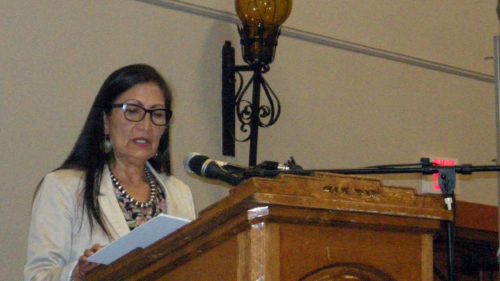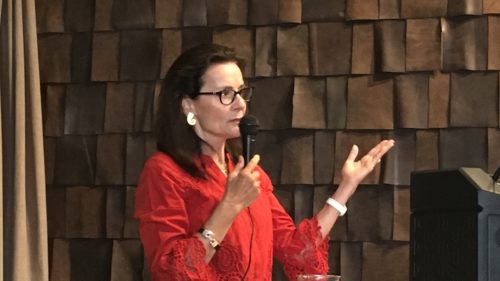The most recent meeting of the Game Commission was held in Ruidoso—here’s what went down!
The first order of business revolved around Mexican grey wolves. Agenda Item 7 gave an update on the wolf lawsuit and Director Alexa Sandoval updated saying that the director’s denial of a release permit was rescinded. The rescinding was approved by the commission. The wolf lawsuit is still active in federal district court.
Next Stewart Liley was supposed to present about the United States Fish and Wildlife Service updated draft recovery plan, but it had not been released at the time of the meeting. He did not want to speculate on what it would look like. Nevertheless, Chairman Paul Kienzle asked if progress had been made to which Liley responded yes. He elaborated that Arizona, New Mexico, and Utah have been working together with Mexico. The involvement of the Mexican government has been an especially important part in making progress in the plan. By working with Mexico the department has gotten a better understanding of the wildlife there, previous plans did not include in depth looks at the wildlife in Mexico. The department went to Mexico and met with biologists working on the ground. Liley added he was more optimistic than previous drafts.
Commissioner Espinoza asked if Liley believed he would feel good about what will come out to which Liley responded that he thinks it will be a good scientific document and will include that Mexican wolves can be brought back to their historic range.
Commissioner Ramos added that he hopes the historic range will be addressed and include target numbers. Liley added that the previous plans did not have recovery goals, but he wasn’t sure what the exact number would be at this point.
A lot of public comments were made on this item, even though no update was given.
Commissioner Kienzle concluded by saying that he’s still waiting to get a document that the department can work with. He said that he sympathized with everyone on every side of this debate and knows it can be frustrating. He added that without more guidance, the commission is “kind of shooting in the dark”. He reminded everyone that the commission is a policy making body so they are always weighing a lot of policy decisions and that this is definitely not a black and white issue.
Moving on, after the presentation of the revocation cases, Commissioner Ryan expressed her concern for what she saw as “a failure of due process.” She said she was optimistic about seeing the house cleaned, and the backlog in the department in failing to address the backlog. She said she’s excited to see the “house cleaned” to fix the failures throughout the revocation process and that she doesn’t like “seeing the cop mentality” with some officers. She expressed annoyance at people getting caught with two fishing poles or putting a typo on their permit as examples to have to come before the magistrate court. She summarized by saying she wants the department to focus on criminals and not people who have just made mistakes.
Agenda items 11 and 12 both dealt with fair chase in different ways. Agenda item 11 addressed using magnification/clarification devices on archery equipment. Ty Jackson explained that some language would be removed to clarify the ruling around scopes on bows and that this was just a discussion item.
Commissioner Ramos expressed his desire to open up the rule to an action item and discussed how magnifiers can help in ethical harvest to more archery hunters. Jackson responded by saying the new rule should be addressing Commissioner Ramos’ concerns and is simply standardizing the rule. Many commissioners expressed their support for the rule changes and giving hunters more opportunity to hunt ethically by harvesting an animal quicker.
There was discussion about getting more youth and women into archery hunting so some discussion was had around crossbow hunting during archery season and how to make archery hunting as accessible as possible to more New Mexicans.
Agenda item 12 dealt with the use of aircraft in hunting. The new rule would say you can fly looking for game at any time so long as you don’t use that information, relay that information, or yourself hunt within 48 hours of landing. This is a very challenging rule to implement for the department, especially the relaying of information portion. The commissioners again discussed the importance of fair chase and making the rule as simple as possible for people to follow and decided the 48 hours language is probably the easiest for everyone. There were some public comments on the burden of guilt being flipped on to anyone flying then having to prove they weren’t scouting which can be difficult on both ends. The department will further investigate the issue and how to address it.
Agenda item 13 was the presentation of the final upland game rule which was approved by the commission.
Agenda item 17 was labeled simply as “trespass” and Chairman Kienzle kicked off the item by saying that the rule it referred to, the Stream Access Rule is not yet in final form yet but he wanted to take some public comment.
Deputy Director Todd Leahy read the following statement: “Mr. Chairman, Commissioners thank you for this time. I would like to direct your attention to an advisory letter from the office of the Attorney General dated August 5th of 2016. That letter states that any interpretation of 17.4-6 that excludes the public from using public waters that are running through or running through private property violates Article XVI Section 2 of the New Mexico Constitution. I have copies here for each Commissioner of that letter if you’re not familiar with the Attorney General’s opinion. It may be easy to dismiss this opinion as just that of one man but when you couple this with the Gary King opinion of a few years ago and the holdings of New Mexico Supreme Court in the Red River Valley Case, I think it’s important that the Commission consider the legality of moving forward with this rule. Thank you.”
Other public comments revolved around road closures and private property and discussed the trespass that many experience on their land. The issue will be picked up again in the fall after the implementation of HB 58.
Agenda item 18 which dealt with the commission’s appeals process was moved. Agenda item 19 was presented by Director Sandoval and dealt with the implications of the new rule development process. House Bill 58 deals with rules around rulemaking in state government. There are a lot of new details for the commission to work out with the time required to submit rule changes and rulemaking.
Public comment was moved before executive session. Many comments revolved around the trespass issue. We remind all sportsmen and women using public lands to respect private property and also let us know when you are locked out of public lands you should have access to.



